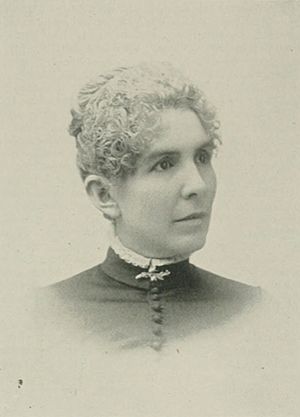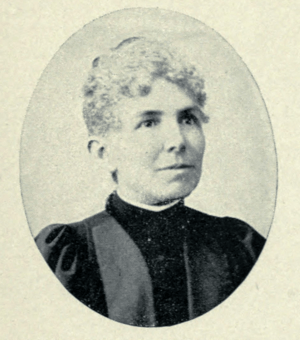Florence E. Kollock facts for kids
Florence E. Kollock (after marriage, Florence Kollock-Crooker) was a pioneering American minister and speaker. She was born on January 19, 1848, and lived until April 21, 1925. She was a Universalist minister, which is a type of Christian faith.
Florence Kollock helped start and lead the Stewart Avenue Universalist Church in Chicago from 1878 to 1892. Later, she became the pastor of the Universalist Church in Pasadena, California (1892–1895). This church had almost 500 members, making it the largest church led by a woman anywhere in the world at that time! From 1904 to 1910, she was also a pastor in Jamaica Plain, Massachusetts.
Besides her church work, Florence Kollock was a leader in many important movements. She spoke widely across the U.S. and in other countries about social issues. She was very involved in efforts to improve society, including the temperance movement (which worked to reduce alcohol use) and women's suffrage (the fight for women's right to vote). She also served as President of the Woman's Centenary Association from 1902 to 1903.
Contents
Early Life and Education
Florence Ellen Kollock was born in Waukesha, Wisconsin, on January 19, 1848. Her parents were William Edward and Ann Margaret (Hunter) Kollock. Her mother was from England.
Florence's parents believed that their daughters should have the same opportunities as their sons. All their children, both boys and girls, graduated from the State University at Madison. They all went on to have professional careers. For example, Florence's oldest sister, Dr. Mary Kollock Bennett, was one of the first women to study at the Ann Arbor Medical College. Her other sisters, Dr. Harriet Kollock and Dr. Jennie Kollock, also became doctors or dentists. Her three brothers became a lawyer, a school principal, and a dentist.
Career as a Minister
After graduating from college, Florence Kollock worked as a school teacher for five years. This work made her feel that she could do even more good by becoming a Christian minister. She also believed that women should be allowed to preach. Her family belonged to the Universalist Church. This church was one of the first to allow women to study for the ministry and become ordained. So, Florence chose this path and studied theology at St. Lawrence University in Canton, New York. She graduated in 1875.
Starting in Wisconsin and Illinois
After her graduation, Florence Kollock began her work as a Universalist minister. She started preaching in Waverly, Wisconsin, in 1876. After two years, she moved to Blue Island, Illinois, a suburb of Chicago. While there, she started a new church mission in Englewood, Illinois, another Chicago community.
After her morning service in Blue Island, Florence would travel several miles to Englewood. She would use any vehicle she could find, or even walk if she had to! The small group of people who first came to hear her quickly grew. Within a year, a new church was formed in Englewood, and she became its pastor in 1879. The University of Wisconsin gave her an honorary master's degree in 1882.
Her first congregation in Englewood had only fifteen people. They met in a Masonic Hall. Florence was very good at organizing. She helped create a thriving Sunday school with over 300 students. She also set up other church activities. She had a strong personality that drew many people to her church. Even people who thought they were "too broad for any church" or had avoided churches before, came to her services. Her church also had many men, which was unusual for the time. She worked in Englewood for about fourteen years. During this time, she helped build two church buildings, including the Stewart Avenue Universalist Church.
Travel and Study Abroad
In 1891, Florence Kollock decided to resign from her church in Englewood to spend a year traveling and studying abroad. She planned to visit Europe, Egypt, and the Holy Land. While abroad, she attended lectures at the University of Oxford and studied at the British Museum. She also wrote articles about co-education (boys and girls learning together) in Europe for newspapers back home. At the British Museum, she learned about ancient Egypt and Assyria.
Work in Pasadena, California
When she returned to the U.S. in 1893, Florence Kollock became an assistant pastor at the Universalist Church in Pasadena, California. This church became the strongest Universalist church on the Pacific Coast. In May 1893, she attended religious services at the World's Columbian Exposition in Chicago. She and seventeen other ordained women ministers sat in the front row of the speaker's platform. In October, she opened the second day of the World's Congress of Representative Women with a prayer. She also gave speeches on topics like "Woman in the Pulpit" and "How All Our Women Can Help." She left the Pasadena church in 1895.
Later Ministry and Marriage
In 1896, Florence Kollock married Dr. Rev. Joseph Henry Crooker, a Unitarian minister. After her marriage, she became known as Florence Kollock-Crooker. She continued her pastoral work in Montana, where her husband was a minister. She also became the corresponding secretary for the Equal Suffrage Association in Montana.
Later, they moved to Troy, New York, and then to Ann Arbor, Michigan. In 1902, Florence Kollock-Crooker was elected president of the Woman's Centenary Association of the Universalist Church. This was the national missionary society for Universalist women. From 1904 to 1910, she served as pastor of the Universalist church in Jamaica Plain, Massachusetts.
Later Life and Death
In 1922, the Crookers bought a home in Elgin, Illinois. Florence Kollock-Crooker passed away on April 21, 1925.
Selected Works
- "The Kindergarten From a Minister's Standpoint", 1890
- "Their Unchristian Criticism", 1890
- "Woman in the Pulpit", 1893
 | Delilah Pierce |
 | Gordon Parks |
 | Augusta Savage |
 | Charles Ethan Porter |



